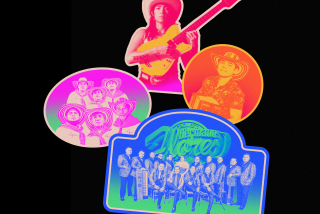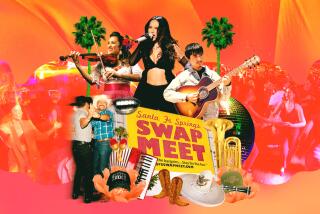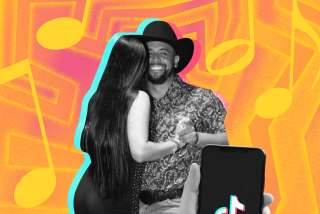Heaven in a Salsa Club
Roberto Villacorta found another religion on the dance floor during furtive escapes from a seminary in Panama, where after seven years he abandoned notions of the priesthood and came to Los Angeles.
Now the 27-year-old native of El Salvador and a group of fellow disciples pursue a dance pilgrimage along a salsa club circuit that includes a stop in the San Fernando Valley.
On Wednesday night, salsa heaven comes to Montego, a sleek nightclub on Ventura Boulevard in Encino. Montego’s weekend disco persona gives way to a bilingual, multicultural happening made up of musicians, dance buffs, artists, members of the Spanish-language media. And anyone else who can’t resist the magic and thunder of the Afro-Cuban music form popularly known as salsa.
“I feel it inside, it’s a vice like liquor,” says Villacorta, who works as a massage therapist by day and goes dancing six nights a week, a different club each night.
He wears pleated pants, white socks that flash at dervish speed, his personalized footwork born of an expertise in Kung fu. Around Villacorta and his partner, Valdi Fishman, the crowd glides and whirls in a stylized fury driven by the barrage of sound from Rudy Regalado and his 11-piece band, Chevere. Blue and red spotlights spatter spike heels, slick hair, leather, silk and skin.
Fishman, a cheerful 30-year-old in an orange skirt, is Israeli. She does not speak Spanish, but knows Villacorta’s moves almost better than he does.
The physical relationship does not go beyond the dance floor. Fishman is married, she says, “but my husband doesn’t dance.”
Roberto says in a rush of Spanish: “I wouldn’t exchange dancing for a woman. I got married and then divorced. My wife didn’t like to dance as much as I did, she couldn’t keep up. You have to choose, salsa or a woman.”
The Montego salseros recognize that their obsession has not emerged fully from the shadows of the American musical consciousness. The work of living legends such as Celia Cruz and Tito Puente (roughly the equivalents of Ella Fitzgerald and Duke Ellington) is trampled with elephantine indifference by watered-down, hyped-up, commercial distortions.
Such as lambada. Yes, Montego patrons enjoy the novelty of the up close and personal Brazilian-style dance and music craze. Club Manager Manuel Fuentes recently acceded to popular demand and added a Brazilian/ lambada night on Thursdays.
But salsa purists are unimpressed by the prepackaged marketing mania surrounding lambada , calling it a flash in the pan.
“It will be gone in six months,” says dancer Myra Odell. “It has been hyped as the new dirty dancing and safe sex and all that. . . . Salsa has an elegance that will last forever. It is sensual in a way lambada is not.”
Venezuelan-born bandleader Rudy Regalado pokes at a salad during a break. It has taken him almost 20 years to become one of the foremost salsa musicians in Los Angeles, a market traditionally less attuned to his music than New York or Miami. The veteran percussionist has a whip-like build, dusky and resilient features. Draped around his neck is the red headband he wears around his curly hair when he plays.
“We don’t mind playing lambada because the public likes to hear it,” Regalado says. But “it has neither roots nor a future.”
A publicist armed with a glass of white wine and a gregarious manner stops by to ask him to play at a college “Latin night.” The publicist unwittingly illustrates the obstacles to expanding the salsa audience without diluting or stereotyping the form.
“Can you guys play Miami Sound Machine?” he asks. “Can you do some Miami Sound Machine tunes? It’ll be fun. . . . We’re going to have Ricky Ricardo and Lucille Ball look-alikes, too. . . . Can you guys wear the white shirts with the ruffles?”
Bringing the real thing to Montego was not easy. Fuentes introduced salsa night last September and hustled. Promotion in Latino-oriented media and word-of-mouth at established clubs have increased the following from dozens to hundreds.
“We have brought this style of music to a new area and to a mix of people,” says disc jockey Luis Ceballos, indicating the blond ponytail bobbing past. “That’s Encino right there. It’s a mixture of salsa purists and a novice Encino crowd.”
Wednesday was the first in a series of friendly showdowns: A dance contest sponsored by a Spanish-language TV station. Couples compete before judges, who will select 10 women for a dance number at a televised concert in Long Beach this summer.
“We are looking for 10 good-looking ladies with great Latin moves,” says producer Harry Abraham.
“What I’m watching for is a clean dancer, someone who really enjoys the act of dancing,” says judge Ingrid Laurentiis, a choreographer. She contemplates a contestant whose solo undulations are accentuated by an extremely short and tight black dress. “That’s more of a showoff.”
The judges choose them unanimously: Valdi Fishman and Myra Odell.
“Two Jewish girls,” Odell exclaims. “I love it.”
The night goes on. Rudy Regalado brandishes his sticks over the timbales. The horn section opens fire. Singer Thania Sanchez unleashes a voice as big as a house.
Looking across the musicians, the dancers, the people at tables swaying to waves of sound, it is hard to spot anyone who doesn’t look like a believer.


